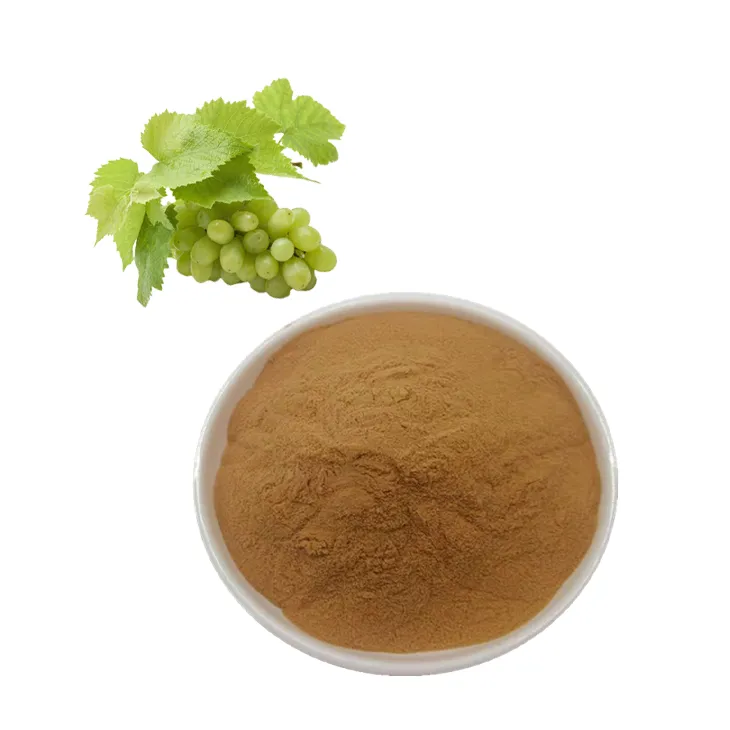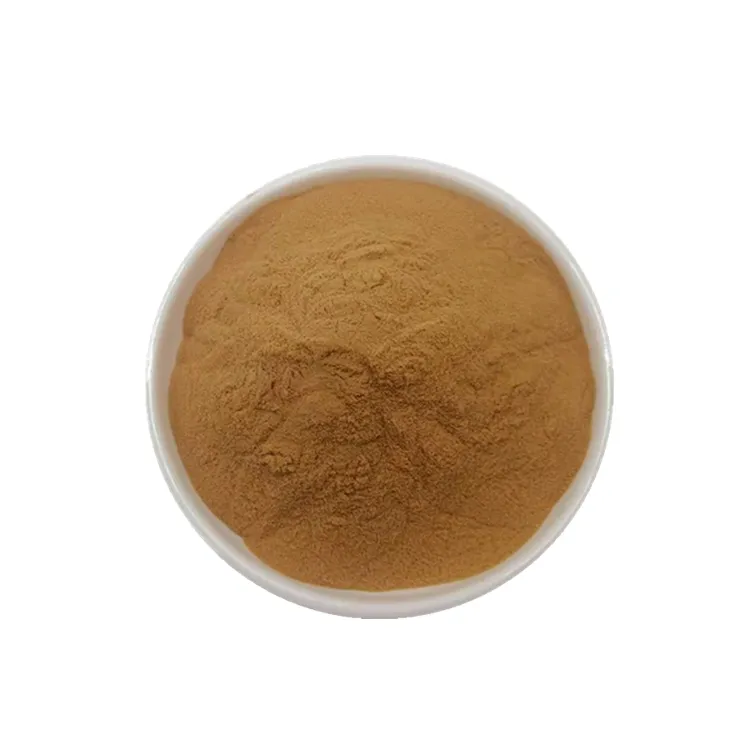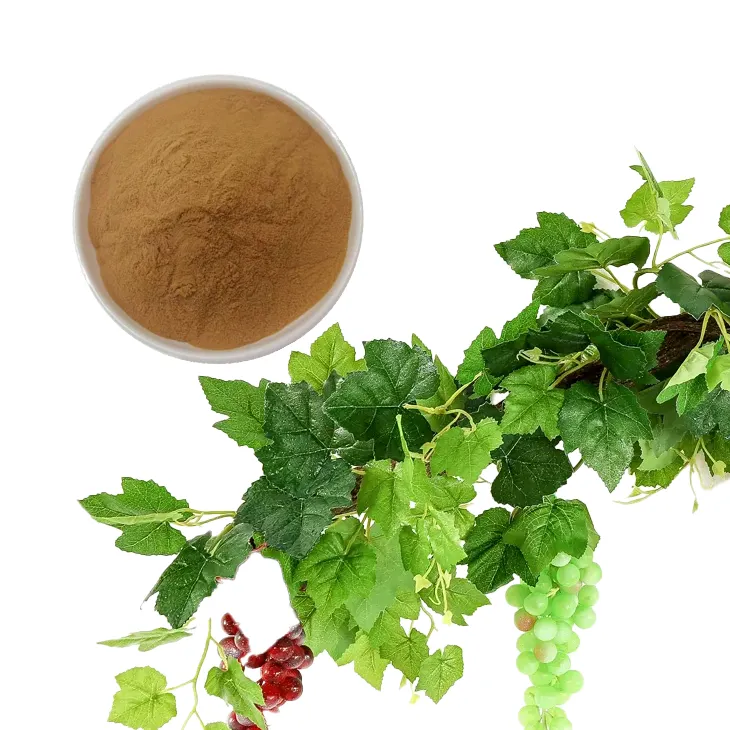- 0086-571-85302990
- sales@greenskybio.com
5 Benefits of Grape Leaf Extract + Dosage, Side Effects
2024-11-13

1. Introduction
Grape Leaf Extract has been gaining attention in recent years due to its potential health benefits. Derived from the leaves of the grapevine, this extract contains a variety of bioactive compounds that may offer several advantages for human health. In this article, we will explore five of the main benefits of Grape Leaf Extract, as well as discuss appropriate dosage and potential side effects.

2. Benefit 1: Antioxidant Properties
Antioxidants play a crucial role in maintaining good health. Grape Leaf Extract is rich in antioxidants such as flavonoids, phenolic acids, and resveratrol. These antioxidants help to neutralize free radicals in the body. Free radicals are unstable molecules that can cause damage to cells, leading to various health problems including aging, heart disease, and cancer.
Studies have shown that the antioxidants in grape leaf extract can reduce oxidative stress in the body. Oxidative stress occurs when there is an imbalance between the production of free radicals and the body's ability to neutralize them. By reducing oxidative stress, grape leaf extract may help to protect cells from damage and improve overall health.

3. Benefit 2: Cardiovascular Health
Another significant benefit of grape leaf extract is its positive impact on cardiovascular health.
3.1 Blood Pressure Regulation
Some research suggests that grape leaf extract may help to regulate blood pressure. High blood pressure is a major risk factor for heart disease and stroke. The bioactive compounds in the extract may work to relax blood vessels, allowing for better blood flow and reducing the pressure on the arterial walls.
3.2 Cholesterol Management
Grape leaf extract may also play a role in cholesterol management. It has been shown to potentially lower LDL (low - density lipoprotein) cholesterol, which is often referred to as "bad" cholesterol. At the same time, it may help to increase HDL (high - density lipoprotein) cholesterol, known as "good" cholesterol. Maintaining a healthy balance of cholesterol levels is essential for heart health.

4. Benefit 3: Anti - inflammatory Effects
Inflammation is a natural response of the body to injury or infection, but chronic inflammation can lead to various diseases. Grape leaf extract has anti - inflammatory properties that can help to reduce inflammation in the body.
Research has indicated that the bioactive compounds in the extract can inhibit the production of inflammatory mediators such as cytokines and prostaglandins. By doing so, it may help to relieve symptoms associated with inflammatory conditions such as arthritis, and may also potentially prevent the development of chronic inflammatory diseases.
5. Benefit 4: Digestive Health
Grape leaf extract can also contribute to good digestive health.
5.1 Gut Microbiota Support
There is evidence to suggest that grape leaf extract may support a healthy gut microbiota. The gut microbiota plays a crucial role in digestion, nutrient absorption, and overall health. By promoting the growth of beneficial bacteria in the gut, grape leaf extract may help to improve digestive function and boost the immune system.
5.2 Anti - diarrheal Effects
Some studies have shown that grape leaf extract may have anti - diarrheal effects. It can help to regulate bowel movements and reduce the frequency of diarrhea. This may be due to its ability to affect the water and electrolyte balance in the intestines.
6. Benefit 5: Diabetes Management
For individuals with diabetes, grape leaf extract may offer some benefits.
6.1 Blood Sugar Regulation
Research has indicated that grape leaf extract may help to regulate blood sugar levels. It can improve insulin sensitivity, which is important for the proper utilization of glucose in the body. By helping to keep blood sugar levels within a normal range, it may assist in the management of diabetes.
7. Dosage
The appropriate dosage of grape leaf extract can vary depending on several factors, including the form of the extract (e.g., capsule, tincture), the individual's age, health status, and the specific purpose for which it is being used.
- As a general guideline, when using grape leaf extract in capsule form, a typical dosage may range from 200 - 500 mg per day. However, it is always best to consult with a healthcare provider before starting any new supplement regimen.
- If using a tincture, the dosage may be adjusted according to the concentration of the tincture. It is important to follow the manufacturer's instructions carefully.
8. Side Effects
While grape leaf extract is generally considered safe for most people, there are some potential side effects to be aware of.
- Some individuals may experience mild gastrointestinal discomfort such as nausea, stomach cramps, or diarrhea. These symptoms are usually rare and may subside on their own.
- In rare cases, allergic reactions may occur. People with known allergies to grapes or grape products should exercise caution when using grape leaf extract.
9. Conclusion
Grape leaf extract offers a range of potential health benefits, including antioxidant properties, support for cardiovascular health, anti - inflammatory effects, benefits for digestive health, and potential assistance in diabetes management. However, it is important to use it appropriately and be aware of the potential dosage and side effects. As with any supplement, it is advisable to consult with a healthcare professional before incorporating grape leaf extract into your daily routine.
FAQ:
What are the five benefits of grape leaf extract?
1. It may have antioxidant properties, which can help protect cells from damage caused by free radicals. 2. There is evidence suggesting it could support cardiovascular health by potentially reducing blood pressure and improving blood lipid profiles. 3. Grape leaf extract might aid in digestion and could help relieve digestive disorders such as indigestion. 4. It may possess anti - inflammatory qualities, which can be beneficial for various inflammatory conditions. 5. Some research indicates that it could play a role in enhancing the immune system.
What is the recommended dosage of grape leaf extract?
The dosage of grape leaf extract can vary depending on several factors such as the form of the extract (e.g., capsules, tincture), the purpose of use, and individual health conditions. Generally, for a standard supplement in capsule form, a common dosage might range from 500 - 1000 mg per day. However, it is always best to consult a healthcare provider before starting any new supplement regimen to ensure the appropriate dosage for your specific situation.
Are there any side effects of grape leaf extract?
In general, when taken in appropriate doses, grape leaf extract is considered safe for most people. However, some individuals may experience mild side effects such as nausea, stomach upset, or allergic reactions, especially those who are sensitive to plants in the grape family. If any unusual symptoms occur after taking grape leaf extract, it is advisable to stop use and consult a doctor.
Can grape leaf extract be used to treat a specific disease?
While grape leaf extract shows potential in various aspects related to health, it should not be considered a sole treatment for a specific disease. For example, although it may support cardiovascular health, it cannot replace medications prescribed for heart conditions. It can be used as a complementary approach to a healthy lifestyle and under the guidance of a healthcare professional, but more research is needed to determine its full therapeutic potential for specific diseases.
How does grape leaf extract support cardiovascular health?
Grape leaf extract may support cardiovascular health in multiple ways. It may help relax blood vessels, which can lead to a reduction in blood pressure. Additionally, it might have a positive impact on lipid metabolism, potentially reducing levels of bad cholesterol (LDL) and triglycerides in the blood. By improving these factors, it can contribute to an overall healthier cardiovascular system.
Related literature
- The Health Benefits of Grape Leaf Extract: A Comprehensive Review"
- "Dosage Considerations for Grape - Based Supplements: Focus on Grape Leaf Extract"
- "Side Effects Associated with Herbal Extracts: The Case of Grape Leaf Extract"
- ▶ Hesperidin
- ▶ citrus bioflavonoids
- ▶ plant extract
- ▶ lycopene
- ▶ Diosmin
- ▶ Grape seed extract
- ▶ Sea buckthorn Juice Powder
- ▶ Beetroot powder
- ▶ Hops Extract
- ▶ Artichoke Extract
- ▶ Reishi mushroom extract
- ▶ Astaxanthin
- ▶ Green Tea Extract
- ▶ Curcumin Extract
- ▶ Horse Chestnut Extract
- ▶ Other Problems
- ▶ Boswellia Serrata Extract
- ▶ Resveratrol Extract
- ▶ Marigold Extract
- ▶ Grape Leaf Extract
- ▶ blog3
-
Cranberry Plants and Skin - care Products.
2024-11-13
-
Fenugreek Extract Powder
2024-11-13
-
Mangosteen extract powder
2024-11-13
-
Green Tea Extract
2024-11-13
-
Lemon Juice Powder
2024-11-13
-
Dandelion Root Extract
2024-11-13
-
Hops Extract
2024-11-13
-
Aminolevulinic acid
2024-11-13
-
Kupilu Extract
2024-11-13
-
Rosemary extract
2024-11-13
-
Curcuma Longa Extract/Turmeric extract
2024-11-13





















